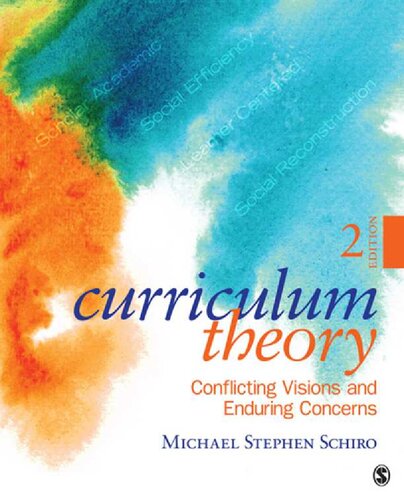Product desciption
Curriculum Theory Conflicting Visions And Enduring Concerns 2nd Edition 2013 2nd Edition Michael Stephen Schiro by Michael Stephen Schiro 9781412988902, 141298890X instant download after payment.
The essential, comprehensive guide for developing and evolving your educational vision
The Second Edition of Curriculum Theory: Conflicting Visions and Enduring Concerns presents a clear, unbiased, and rigorous description of the major curriculum philosophies that have influenced educators and schooling over the last century. Author Michael Stephen Schiro analyzes four educational visions—Scholar Academic, Social Efficiency, Learner Centered, and Social Reconstruction—to enable readers to reflect on their own educational beliefs, and more productively interact with educators who might hold different beliefs.
Michael Stephen Schiro
Boston College, USA
Michael Stephen Schiro has taught at the elementary, middle, and high school levels. He received his bachelorate from Tufts University and his doctorate from Harvard University. In the 1960’s he worked for school desegregation n North Carolina. In the 1970’s he worked to improve urban education in Lowell, Massachusetts. He was chair of the Department of Teacher Education and School Administration at Boston College in the 1980’s. He specializes in mathematics education and curriculum theory, and taught courses in mathematics education, curriculum theory, computer education, literacy, and multicultural education at Boston College from 1974 to 2009, when he retired. He published eleven books with such diverse titles as Integrating Children's Literature and Mathematics in the Classroom, Oral Story Telling and Teaching Mathematics, Mega-Fun Math Games, Curriculum for Better Schools: The Great Ideological Debate, and Tan and the Shape Changer.
Reviews:
Helps with course planning. Too advanced for the level of the course.
Margaret Ferrara
Curriculum, Teaching and Learning, University of Nevada - Reno
January 1, 2013
NEW TO THIS EDITION:
In Chapter 2, the section on teaching was reorganized and a new subsection added on Teachers as Transmitters, Mediators, or Translators.
Several new sections on the Learner Centered ideology, including one major section that provides a description and analysis of a Learner Centered curriculum. Other sections include elements such as a discussion of the relationship between knowledge and experience, and the nature and structure of the learning environment of the ideology.
Seven new sections have been added to Chapter 6, including six play in which four teachers discuss their beliefs about enduring curricular issues and related current "hot" curriculum topics in ways that highlight the differences between the ideologies.
An additional section in Chapter 6 discusses differences in how each of the ideologies takes advantage of the use of technology in curriculum and during instruction.
Visit www.sagepub.com/schiroextensionactivities for access to valuable extension activities for each chapter. In addition, the following additional activities are available at this site:
Curriculum ideologies inventory
Curriculum scope, sequence, integration, and continuity simulation
Curriculum materials
Example of an ideologies play
Comments on extension activities for faculty teaching courses on curriculum


